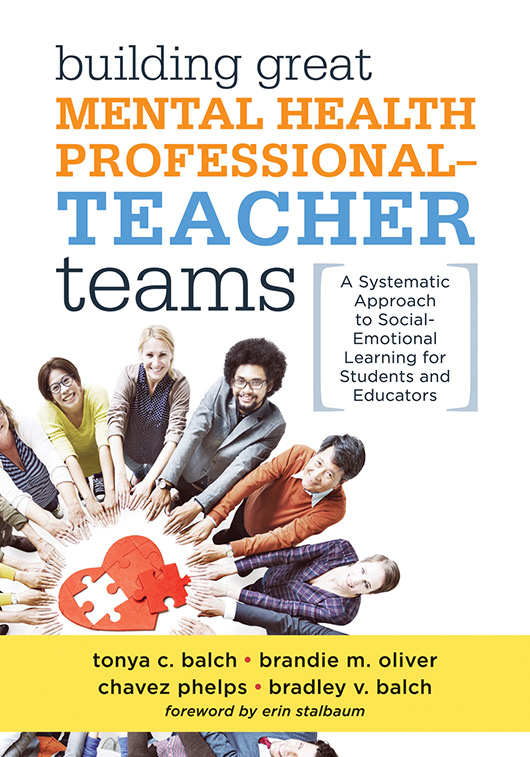Free Reproducibles
Building Great Mental Health Professional–Teacher Teams
Learn how teachers, school counselors, psychologists, and social workers can harness their collective power to support the complex needs of students through meaningful team building. Foster productive social-emotional learning (SEL) that promotes a whole-child education.
Benefits
- Discover how cognitive science and neuroscience can help educators better understand challenging students and plan interventions.
- Understand why teams, rather than just groups, matter and how they can achieve true team cohesion through practical advice for connection building and goal setting.
- Develop greater sensitivity to the needs of a diverse array of students, and discover ways to build trust, respect, and inclusivity within schools.
- Learn how to examine and resist one’s own implicit biases.
- Gain a deeper understanding of how social-emotional learning (SEL) positively impacts students and classrooms and how to incorporate it into everyday instruction.
- Access professional development activities designed to help teams enact each chapter’s content and strengthen the group dynamic.
TABLE OF CONTENTS
Chapter 1: Social-Emotional Risk Factors
Chapter 2: Mindfulness
Chapter 3: Growth Mindset and Resilience
Chapter 4: Trauma-Informed School Practices
Chapter 5: Restorative Practices
Chapter 6: Dysregulated Students and Intervention Implementation
Chapter 7: Solution-Focused Brief Therapy
Chapter 8: Safety and Implicit Bias
Chapter 9: Educator Well-Being
Chapter 10: The Future of the Mental Health Professional-Teacher Team
PRINTABLE REPRODUCIBLES
Introduction
Chapter 1
Chapter 2
Chapter 3
- Table 3.3: Seven Cs of Resilience and Coordinating Strategies
- Professional Development Activity on Mindset
- Figure 3.1: Professional Development Activity on Mindset—Seven Cs Strategy Form
Chapter 4
- Figure 4.1: ACEs Test
- Figure 4.3: Discipline Data Checklist
- Professional Development Activity on Childhood Trauma Awareness
Chapter 5
- Figure 5.4: Professional Development Activity on Applying Restorative Practices—Handout One
- Figure 5.5: Professional Development Activity on Applying Restorative Practices—Handout Two
- Figure 5.6: Professional Development Activity on Applying Restorative Practices—Vignettes
- Figure 5.7: Professional Development Activity on Applying Restorative Practices—Emotion Handout One
- Figure 5.8: Professional Development Activity on Applying Restorative Practices—Emotion Handout Two
- Professional Development Activity on Applying Restorative Practices
Chapter 6
- Figure 6.2: Data-Based Decisions
- Figure 6.4: Professional Development Activity on Tiered Interventions
- Professional Development Activity on Tiered Interventions
Chapter 7
- Figure 7.1: Mood Chart Example
- Figure 7.2: Professional Development Activity on SFBT—Vignettes
- Professional Development Activity on Solution-Focused Brief Therapy
Chapter 8
Chapter 9
Chapter 10
- Figure 10.1: Adult Survey Questions
- Figure 10.2: Student Survey Questions
- Professional Development Activity on Leadership Reflection as a Team
- Figure 10.3: Professional Development Activity on Leadership Reflection as a Team—Quotable Quotes
- Professional Development Activity on Classroom Intervention Implementation
SUGGESTED RESOURCES
BOOKS
- Balch, T. C., & Balch, B. V. (2019). Building great school counselor–administrator teams: A systematic approach to supporting school, staff, and the community. Bloomington, IN: Solution Tree Press.
- Boogren, T. H. (2018). Take time for you: Self-care action plans for educators. Bloomington, IN: Solution Tree Press.
- Boogren, T. H. (2020). 180 days of self-care for busy educators. Bloomington, IN: Solution Tree Press.
WEBSITES
- 100 Ways for Parents to Be Involved in Their Child’s Education
- Awake and Mindful
- Behavior and Emotional Screening System
- Big Life Journal’s activities
- Bounce Back
- California State University in Sacramento
- Character Counts!
- Children's Health Insurance Program
- Child Nutrition Program
- Cognitive Behavioral Intervention for Trauma in Schools (CBITS)
- Collaborative for Academic, Social, and Emotional Learning
- Compassion Fatigue/Satisfaction Self-Test
- Conflict Resolution—Elementary
- Conflict Resolution—Secondary
- Dr. Dan Siegel’s Hand Model of the Brain
- Earned Income Tax Credit
- EducatorAide
- Federal Pell Grant Program
- Fidgets
- Fostering Hope Initiative
- Full Discipline Data Checklist
- Getting Involved in Your Child’s Education
- Glenview Elementary School video
- Growth Mindset Scale
- Head Start
- Headspace
- Health Insurance Marketplace
- Implicit Association Test
- International Institute of Restorative Practices
- Kindness Printables
- Lesley University and Massachusetts Advocates for Children
- Low-income Home Energy Assistance Program
- Medicaid
- Mindful Schools
- Mindset Kit
- MindUP
- National Child Traumatic Stress Network
- NCTSN Treatment and Services Adaptation Center for Resilience, Hope, and Wellness in Schools and the Center for School Mental Health
- NEA Resources for Parents
- Neuroplasticity
- PBISApps
- Peace Corner: Creating Safe Space for Reflection
- San Francisco United School District
- Search Institute’s forty developmental assets
- Second Step
- Smiling Mind
- Social and Emotional Learning: Coaching Toolkit
- Special Supplemental Food Program for Women, Infants, and Children
- Stamm’s sixty-six-item assessment
- Subsidized Housing, Housing Vouchers, and Public Housing Programs
- Super Healthy Kids
- Supplemental Nutrition Assistance Program
- Supplemental Security Income Program
- Teaching Tolerance
- TED Talk, How Childhood Trauma Affects Health Across a Lifetime
- TEDx Talk, Compassion Fatigue
- Temporary Assistance for Needy Families
- The OT Toolbox
- The Professional Quality of Life
- U.S. Department of Health and Human Services
- What’s My Mindset?

